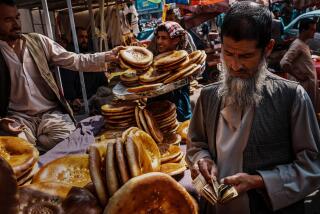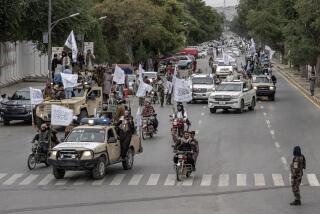A Flurry of Activity in the Capital Is Prelude to Afghanistan’s Recovery
- Share via
KABUL, Afghanistan — The Marines have landed. There is activity at the U.S. Embassy here for the first time in a dozen years. The U.N. envoy for Afghanistan has deemed preparations for a Dec. 22 hand-over of governing power on track. Even the national currency, the afghani, which a day earlier sold for 36,500 to the dollar, took an 8% leap of faith Tuesday that this war-ravaged country is on the cusp of peace and recovery.
Although distant warlords continue to grumble about the power-sharing accord signed in Germany just a week ago, there are growing signs that the installation of an interim government in 10 days is being accepted as a foregone conclusion, and one that warms the hearts of war-weary Afghans.
Racked by bloodshed, occupation and political intrigue for nearly three decades, Afghanistan is in ruins, with most urban housing destroyed, schools and public services suspended, roads blasted by bombs and the majority of the population unemployed.
But for the first time since the last king was deposed in 1973, a concerted international effort to aid, advise and rebuild Afghanistan is taking root. The few dissenters to the Bonn agreement are being ignored in the rush by other Afghans and the outside world to shore up still-wretched security and give peace a chance.
After meetings with five major figures in the Northern Alliance force now in control of most of the country, U.N. special envoy Lakhdar Brahimi proclaimed that preparations for next week’s transfer of power are moving along swiftly.
“We hope we can have a lasting peace,” acting Foreign Minister Abdullah said as he greeted Brahimi. “We hope this will be a historical moment” for Afghanistan.
Even the president deposed by the Taliban five years ago, Northern Alliance leader Burhanuddin Rabbani, has pledged support for the power-sharing process, Brahimi said. Rabbani forced several delays in the talks in Germany by pressuring his faction to insist on retaining most power.
“He has repeated his concerns, but he also committed himself in no uncertain terms to cooperation and support for this process,” Brahimi told a news conference.
Alliance military chief Mohammed Qassim Fahim, soon to become defense minister in the interim government, also met with Brahimi and told reporters later that international peacekeepers for Kabul should number fewer than 1,000 and be used only for protecting foreign dignitaries and official meetings. That appeared to put fresh conditions on the foreign force agreed to in Germany to deploy across this edgy capital to ensure the smooth flow of aid and unimpeded nation building.
Brahimi said Fahim was on board with the peacekeeping plan, although they didn’t discuss specific numbers for the force, which could be deployed as early as next week.
“The force, if and when it comes, will come as a friend, not as an enemy,” Brahimi said. “So I think the issue of numbers is not going to be a problem, and also what it does and does not do will be the subject of an agreement with the authorities.”
Although no specific size has been decided for the Kabul deployment, U.N. officials and those from countries ready to contribute troops have been talking of a force of about 5,000. Britain is expected to command the force and send the largest contingent.
Brahimi left for Pakistan for further talks on preparations for the inauguration of Kabul’s 30-member interim government but was due back in time for the event. His spokesman, Ahmed Fawzi, said Brahimi would then stay in Kabul to oversee the transfer for “as long as it takes.”
Brahimi said a “very large number of countries” have advised him that they will be sending delegations to the ceremony, and many are planning to restore their diplomatic presence here.
At the U.S. Embassy, abandoned in 1989, a detachment of Marines from the amphibious assault ship Bataan in the Arabian Sea arrived Monday to begin readying the site for the return of American envoys. Troops in desert camouflage bagged the ubiquitous dust to help reinforce perimeter guard shacks and patrolled an inner courtyard littered with the charred remains of American cars once used to shuttle diplomats.
“We’re here to provide security and to work with Department of State personnel to reestablish the embassy in Kabul,” was all Sgt. Andrew D. Pomykal was authorized to tell The Times through battered iron gates of the local employees’ entrance. The main gate to the compound was still sealed with metal plates that have been pierced by bullets and dented by repeated protests against the symbol of U.S. power.
Two men in khaki trousers and blue pullovers bearing U.S. government insignias refused to talk to reporters. However, the special U.S. envoy to Afghanistan, James Dobbins, said last week that Washington wanted to have a diplomatic presence here before the hand-over.
Iran has already reopened its embassy, and Britain, France, Russia and other major powers have had advance teams in the capital to assess their options for returning.
Perhaps the most measurable sign of hope in Kabul was the sudden boost the foreign influx gave to the battered afghani. Its value against the dollar in local exchanges rose 8% overnight after the Marines’ arrival.
“People see this as proof that Afghanistan is becoming more stable,” said money trader Abdul Walih at Kabul’s crowded central market, where the slightly better buying power was allowing Afghans to stock up for end-of-Ramadan celebrations, which are to begin after the weekend.
More to Read
Sign up for Essential California
The most important California stories and recommendations in your inbox every morning.
You may occasionally receive promotional content from the Los Angeles Times.














